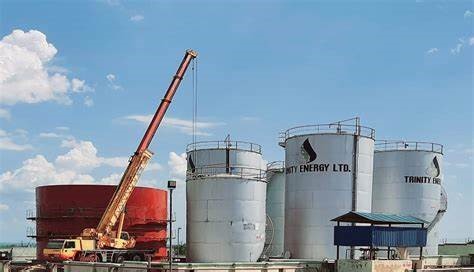By Yiep Joseph
Economists urge South Sudan government to stockpile essential goods, particularly fuel, to safeguard the country from Israel-Iram conflict disruptions.
Abraham Maliet, an economist, forecasts prospects of likely ongoing Middle- East hostility’s impacts to South Sudan’s economy, as like on other parts of the world.
He emphasized the need for immediate action to mitigate potential consequences.
“My message to South Sudan government is to store essential commodities like fuel, so we have a buffer if the situation worsens,” Maliet said.
The appeal comes as Israel and Iran engage in airstrikes and bombardments, which have already led to a surge in oil prices due to increased demand for fuel.
The economist stressed that adequate fuel storage would help meet demand in the event of disruptions in oil exports. He reassured citizens that, despite the global crisis, it is manageable and can be resolved.
“We are affected, like many other parts of the world, but there will be solutions,” he added.
The threat posed by Iran’s plans to potentially close vital oil passageways raise significant concerns for countries reliant on oil trade, including South Sudan.
Maliet pointed out that, South Sudan, as an oil-exporting nation is not immune to repercussions of the conflict.
However, he noted that the current impact is manageable, unless the situation escalates further.
Maliet acknowledged that while the conflict impacts global dynamics, including South Sudan, it should not instill panic among citizens.
He noted that international oil traders, typically, find alternative routes to maintain trading activity.
“International oil traders have their own strategies to navigate such crises,” he said.
He also highlighted the economic principle of supply and demand, warning that rising oil prices are not always beneficial for oil-producing countries like South Sudan, as they can drive up the costs of other commodities.
“An increase in prices often leads to higher costs for essential goods,” he stated.
Meanwhile, Emmanuel Makuch, another economist based in Kenya, echoed similar concerns, emphasizing the importance of government vigilance regarding the Israel-Iran conflict.
He warned that while the immediate effects may not be apparent, any escalation could harm the country’s economy.
“As oil producers, we must remain alert, as our commodity is influenced by global market conditions,” Makuch said.
He encouraged citizens to stay calm, assuring them that the South Sudan government, like others worldwide, is committed to mitigating market disruptions and implementing effective measures.
The economist reiterated that conflicts anywhere, could affect businesses globally, but appropriate responses are always possible.



